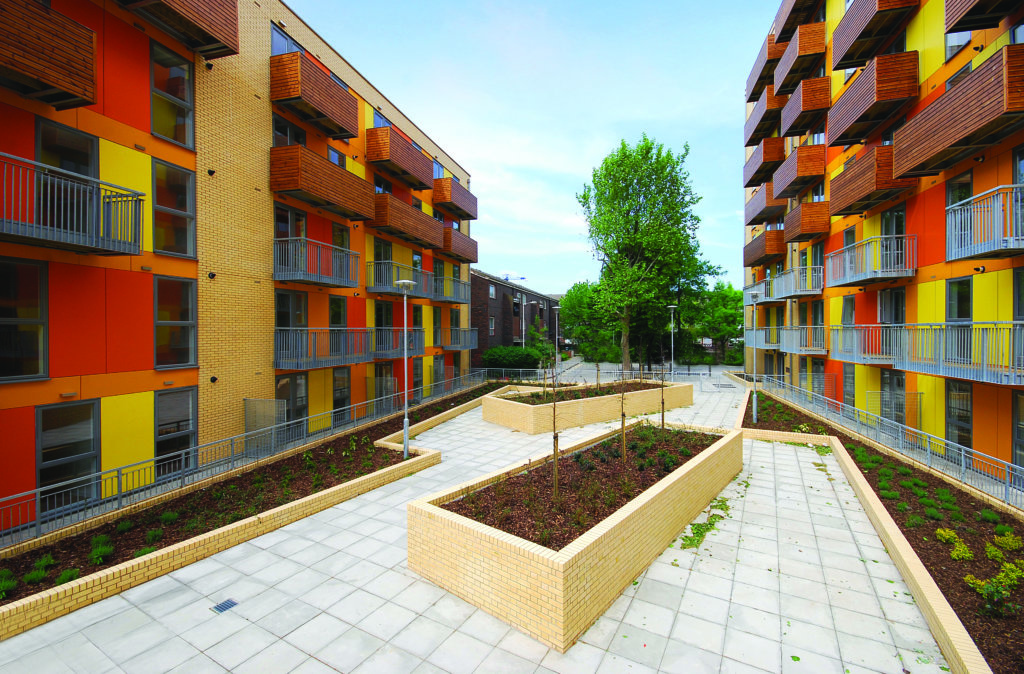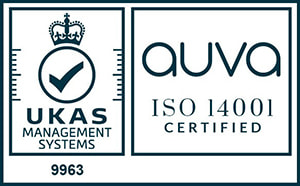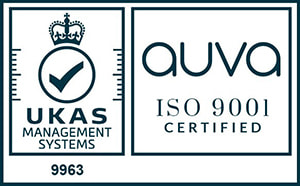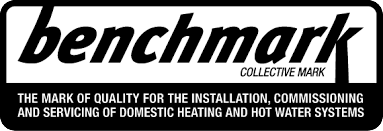
Genesis Housing
In 2009 Stephen Davy Peter Smith Architects designed two apartment blocks in Hoxton for Genesis. It was clad in a bright orange and yellow Trespa cementitious composite, and every inch of space in these light and airy flats was usable. What this meant for Simon Bowles, Building Services Engineer at Genesis, was that the boiler couldn’t go on the exterior kitchen wall. With the kitchen a “no go”, the only location was the hallway cupboard… and this created its own set of challenges.
The long and the short of it
As the hallway cupboard was nowhere near an external wall, the only option was to install a twin flue system which could be concealed in the ceiling void. The two flue outlets, which would have to exit through the cladding, needed to look as inconspicuous as possible, to retain the integrity of the architect’s design. The solution was to reduce the outlets to one by using a concentric flue terminal adaptor.
At the time there was only one boiler brand that could accommodate this flue arrangement and this was installed. But when the boilers became inefficient and started failing, and the flues, under the constant assault of acidic gas emissions and constant hot/cold temperatures, were degrading and becoming brittle, Genesis had a new set of challenges. Another boiler brand with its own associated twin flue was installed, but a second hole to accommodate the twin flue had to be made in the external cladding after all. This went against the architect’s vision, it was not the ultimate solution Genesis was looking for, and Bowles was not convinced it was the most energy efficient option.
After looking at many brands, the Intergas HRE model ticked all the boxes: robust construction, only 12 components (including four moving parts) and an aluminium and copper bithermic heat exchanger. As far as Genesis was concerned, all of this equated to built-in reliability. The fact that the boilers also condense in both heating and hot water modes, meant customers would benefit from vastly improved economy.
Intergas turns around supply chain for Genesis
To reassure himself that the boiler really did what it said on the tin, Bowles visited the factory in Coevorden in the Netherlands. “It was while I was talking to the technical team that I realised not only do all Intergas boilers accommodate twin flues, the company also supplies them and the all-important concentric terminal,” said Bowles. “And their terminal would fit exactly through the existing pre-cut hole in the cladding.” Although this product was only sold in Europe and Canada, Intergas decided that it would make this available to the UK. Within a matter of weeks, the product catalogue and specification were being written and, 12 weeks later, Genesis received the first consignment of Intergas twin flues and terminals. It is the first organisation to install this flue system in the UK and will be replacing the boilers and flues in all the flats with Intergas as part of its reactive replacement programme.
“Dedication and belief in your product is important to me,” added Bowles. “I’d already heard about Intergas and its record of reliability, but it was when they spoke with such passion and in-depth knowledge I decided I should take a serious look. For a company to have the will and flexibility to turn around a supply chain so quickly for Genesis was impressive.”
Demonstrating best practice
The domestic condensing boiler should be the most energy efficient, environmentally sound and reliable that it can be, but not all condensing boilers retain their efficiency over time. The Intergas HRE provides the reliability of a product that has been designed to run as efficiently as possible, 24/7, year in, year out.
First, only having one heat exchanger makes the boiler the ultimate energy saver as it doesn’t have to work as hard to reach the required temperature. Second, there are only four moving parts, and all the parts that stick, leak and let you down aren’t there – there’s no diverter valve, auto air vent, secondary hot water plate heat exchanger or valve motor.
Add to that the fact there are virtually no standby losses, these boilers have played their part in helping to reduce customers’ fuel bills and Genesis’s service and maintenance costs.
Eco RF to be written into Employer’s Requirements
Since this article was first published, there’s been a positive development: Genesis customers are now going to benefit from increased duty of care too. The Intergas Eco RF, with its remote management facility, is now being considered for all Genesis’s new builds, and will be written into the Employer’s Requirements for all reactive boiler upgrades. This facility will enable Genesis and its contractors to monitor individual systems, cutting down on response times to any customer calls for no hot water or heating; and the efficiency of the system, compared to actual gas bills, can also be monitored which, in turn, will verify whether the system is working at its optimum.






